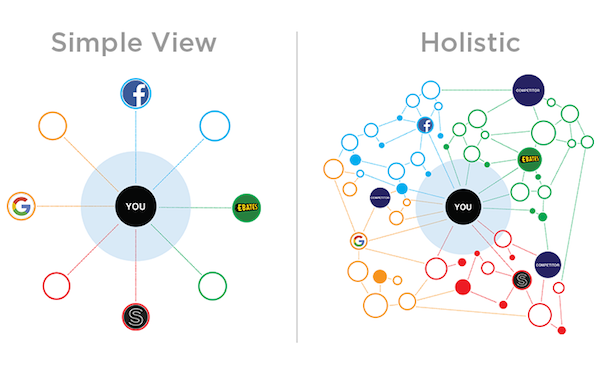Two weeks ago, Amit Kumar announced on the Yahoo! Search Blog that Yahoo! will be supporting semantic web standards in their new Yahoo! search open platform.
This is a game-changing moment in online marketing.
Essentially, Yahoo! is proposing that search will be the “killer app” for sparking the explosion of the semantic web into the mainstream. With this release, when Yahoo! recognizes semantically tagged data in the pages it crawls — structured data such as contacts, calendar events, reviews, blog/news feeds, etc. — it will present far more compelling summaries of those pages in its search results.
As their example shows with a LinkedIn profile, results no longer have to be bland snippets of text that all blur together on the page. Different types of results can pop, conveying far more information — and far more relevant information — to searchers. The quality and meaning of the data shines through, which reflects extremely well on the site represented by that result.
This creates a tremendous incentive for marketers to adopt semantic standards in their web sites.
According to a presentation at SES NY by Andrew Tomkins, Chief Scientist at Yahoo! Search, this semantic data will initially only effect the presentation of the results — officially it will have no impact on a listing’s placement in search engine result pages (SERPs), to prevent this from becoming a way for people to game the system.
Over time, I believe this position will change as the search engines develop better ways to police good vs. bad semantic data, since great semantic results make the search engine look good. And even in the semantic web, people aren’t going to page through more than the first couple of pages of results. Exposed semantic data adds to the quality of the results. (This is not dissimilar to how people have been leveraging YouTube videos and Flickr photos to appear in advantageous locations in Google’s “universal search”.)
In the meantime, however, there will still be a positive feedback loop to incentivize marketers: great SERP summaries that stand out with semantic data will no doubt win a higher click-through rate. The more people who click-through and view your site, the more of them will end up creating links back to your site. This in turn will increase your organic search engine rankings, and the virtuous circle continues.
Simply put by Kumar, the benefit will be “increased traffic quality and quantity”.
What marketer doesn’t want that?
But to get in on this new game, companies need to get their semantic web act together. Since that virtuous cycle favors first movers — who will clearly stand out more in the early days before everyone is doing this as a matter of course — there is value to moving fast.
Many companies already have search engine optimization (SEO) initiatives underway, either with their own internal web team or through an engagement with a search agency. It probably makes the most sense for those teams to lead the initial charge into semantic web optimization (SWO) because they’re already familiar with process of tagging pages and subtly alternating the structure of the site to improve its search engine rankings.
However, the semantic web is qualitatively different than SEO. It requires a deeper understanding of the business being represented online — combined with a strong mastery of semantic web standards such as RDF and microformats — so as to strategically identify the best ways to position a company in the data web. That is going to require collaboration higher up the chain of the organization.
Sure, there will be some low hanging fruit in the early days, with reviews, blog feeds, and event calendars. But to go beyond that superficial level of semantifying will require companies to start to shape their business around producing competitively advantageous semantic data on the web — and where necessary, advocating in the semantic web community to shape the evolution of new semantic web standards.
Companies who know what they’re doing here will be active participants in places such as microformats.org and the Yahoo! developer community, taking a proactive role in moving the semantic web forward in ways that benefits them and their customers. (Word of advice: don’t jump into this fray half-cocked.)
This sort of new way of looking at marketing and the semantic web is what will be the core of semantic marketing. It’s as strategic as it is tactical.
In short, this next generation of web optimization isn’t your father’s SEO. It’s a significant enough advance that I think it would be great to have a different badge to identify it, so as to not fall into the lull of thinking this is just a linear extension of existing search engine diplomacy. I propose:
SEO + Semantic Web = SEO++
(Pronounced: so-plus-plus.) This is a nod to the sea-change that happened when software developers embraced object-oriented programming, moving from C to C++. This is an analogous paradigm shift that will require people to think differently about SEO. And after all, the semantic web is very much about representing and working with “objects” in web space.
Arguably, search engines have been the primary driver of Internet marketing. Yet for 10 years, the interface of search engines has pretty much stayed the same. Google’s universal search was a step in the right direction, but this new move from Yahoo! promises to be a major leap. No doubt, it will be followed by Google and will inspire a spectacular round of search engine innovation — one that will present incredible new opportunities for technology-savvy marketers.
This is the wake-up call: marketing must understand the semantic web and start to think strategically about it.




Hey. Great article – glad to hear w3c standars will be more valued than they are now. Blind people using screen readers and people browsing net via mobile phones or pdas will appreciate this for sure.
Richard
I go sphinn your post 😉
You forgot to mention the biggest piece to this new SEO puzzle: RDFa [1]. It is the embedded form of RDF and is much more powerful and extensible than microformats. Yahoo is supporting RDFa along with microformats.
I have a blog post that takes what you have written and presents it in the eyes of a developer who builds these next generation web sites [2].
[1] http://en.wikipedia.org/wiki/RDFa
[2] http://www.sitepoint.com/blogs/2008/03/16/why-rdfa-is-the-only-web-scaleable-metadata-format-for-next-generation-search-engines/
@Richard — thanks for the comment and the sphinn. You bring up a good dimension that I hadn’t even considered: accessibility. This will also help with ability to selectively translate results with the right context and higher accuracy too.
@David — great post on RDFa! Your points about the scalability and mixability of RDFa vs. microformats are particularly compelling. While microformats probably seem to be the low-hanging fruit to most folks just getting into it, a true RDF implementation is clearly the path to the real semantic web (hence its W3C recommendation). Will be interesting to see what happens when Google jumps in, as they could tip the scales one way or the other. Thanks for the comment and the links!
SEO + Semantic Web = SEO++
Yahoo!’s announcement for semantic web support will change the nature of SEO in big ways. It’s a significant enough advance that it would be helpful to have a different badge to identify it, so as to not fall into the lull of thinking this is just a li…
love that. thank you.
Great article about SEO++!
What exactly meaned with semantic marketing?
Well with Yahoo’s recent deal with Microsoft, I don’t know how much this matters anymore. At least for the moment. Google is making similar changes, I think, but it’ll likely be a good long while before we start to see them having much of an effect.
I like your example of moving from #C to C++. Same set of rules, different board/game. I suppose the same goes for SEO in a way. Semantic web might force SEOs to look at the entire marketing process from a different angle. Though, it’s 2012, and it hasn’t really changed much so far, has it? I suppose we’ll just have to wait and see.
(Pronounced: so-plus-plus.) This is a nod to the sea-change that happened when software developers embraced object-oriented programming, moving from C to C++. This is an analogous paradigm shift that will require people to think differently about SEO. And after all, the semantic web is very much about representing and working with “objects” in web space.